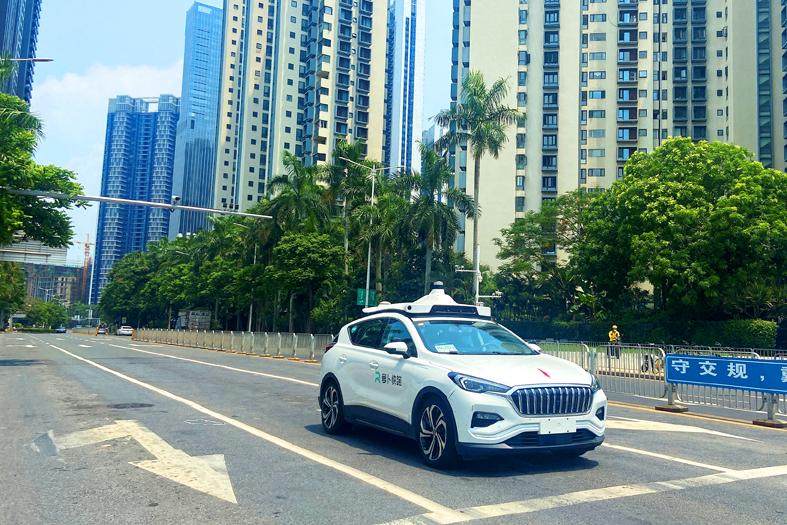Baidu Inc (百度) has won approval to deploy the first fully autonomous self-driving taxis on China’s roads, giving it an edge over rivals such as Pony.ai Inc (小馬智行) and XPeng Inc (小鵬汽車).
The tech giant has secured permits to operate robotaxis in Wuhan and Chongqing, it said in a statement yesterday.
The move marks a relaxation of Chinese rules, which previously mandated someone must be in the vehicle to take control in case of an emergency.

Photo: Reuters
Baidu is to begin to provide fully driverless robotaxi services in designated areas in Wuhan between 9am to 5pm, and Chongqing from 9:30am to 4:30pm, with five Apollo fifth-generation robotaxis operating in each city. The service area covers 13km2 in the Wuhan Economic & Technological Development Zone, and 30km2 in Chongqing’s Yongchuan District.
Baidu is working with regulators in Beijing and Guangzhou to obtain similar permits, Baidu Intelligence Driving Group vice president Wei Dong (魏東) said.
“It’s as if we’ve landed on the moon and built a base there,” he said in a video interview. “It’s just a matter of time for us to go to Mars or even beyond our solar system.”
In the US, Cruise LLC in June won a license to charge for fully driverless rides in selected areas in San Francisco, but the General Motors Co-backed start-up is now facing regulatory scrutiny after two on-road incidents, including an accident that left two people with minor injuries.
In China, Baidu and self-driving start-up Pony.ai earlier this year received approval from local regulators to deploy vehicles without someone in the driver’s seat in part of Beijing.
Baidu, which operated China’s largest search engine, is transitioning to artificial intelligence and self-driving vehicles after its core advertising revenue shrank in the mobile era.
Its smart-driving business provides software to automakers such as Geely Automobile Holdings Ltd (吉利汽車) and runs a ride-hailing app powered by a fleet of self-driving vehicles in major cities, including Beijing and Shanghai.
Baidu last month unveiled a new version of its robotaxi, called the Apollo RT6, that it sad costs nearly 50 percent less to make than its previous model.
The company plans to double the number of robotaxis it has on Chinese roads to 600 by the end of this year, Wei said.

DIVIDED VIEWS: Although the Fed agreed on holding rates steady, some officials see no rate cuts for this year, while 10 policymakers foresee two or more cuts There are a lot of unknowns about the outlook for the economy and interest rates, but US Federal Reserve Chair Jerome Powell signaled at least one thing seems certain: Higher prices are coming. Fed policymakers voted unanimously to hold interest rates steady at a range of 4.25 percent to 4.50 percent for a fourth straight meeting on Wednesday, as they await clarity on whether tariffs would leave a one-time or more lasting mark on inflation. Powell said it is still unclear how much of the bill would fall on the shoulders of consumers, but he expects to learn more about tariffs

NOT JUSTIFIED: The bank’s governor said there would only be a rate cut if inflation falls below 1.5% and economic conditions deteriorate, which have not been detected The central bank yesterday kept its key interest rates unchanged for a fifth consecutive quarter, aligning with market expectations, while slightly lowering its inflation outlook amid signs of cooling price pressures. The move came after the US Federal Reserve held rates steady overnight, despite pressure from US President Donald Trump to cut borrowing costs. Central bank board members unanimously voted to maintain the discount rate at 2 percent, the secured loan rate at 2.375 percent and the overnight lending rate at 4.25 percent. “We consider the policy decision appropriate, although it suggests tightening leaning after factoring in slackening inflation and stable GDP growth,”

Greek tourism student Katerina quit within a month of starting work at a five-star hotel in Halkidiki, one of the country’s top destinations, because she said conditions were so dire. Beyond the bad pay, the 22-year-old said that her working and living conditions were “miserable and unacceptable.” Millions holiday in Greece every year, but its vital tourism industry is finding it harder and harder to recruit Greeks to look after them. “I was asked to work in any department of the hotel where there was a need, from service to cleaning,” said Katerina, a tourism and marketing student, who would

i Gasoline and diesel prices at fuel stations are this week to rise NT$0.1 per liter, as tensions in the Middle East pushed crude oil prices higher last week, CPC Corp, Taiwan (台灣中油) and Formosa Petrochemical Corp (台塑石化) said yesterday. International crude oil prices last week rose for the third consecutive week due to an escalating conflict between Israel and Iran, as the market is concerned that the situation in the Middle East might affect crude oil supply, CPC and Formosa said in separate statements. Front-month Brent crude oil futures — the international oil benchmark — rose 3.75 percent to settle at US$77.01